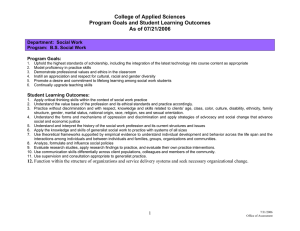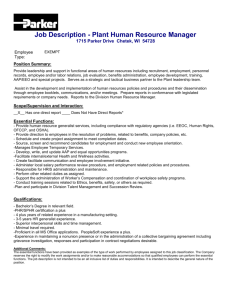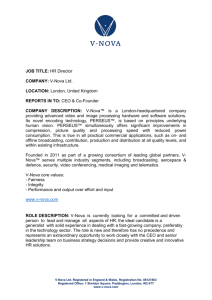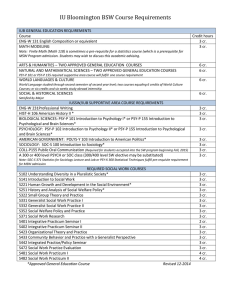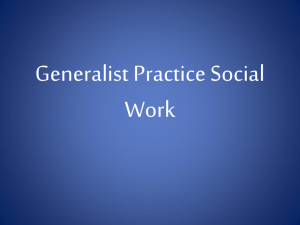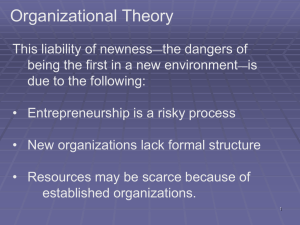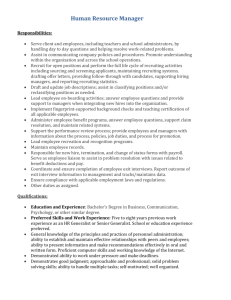Wichita State University Libraries SOAR: Shocker Open Access Repository
advertisement
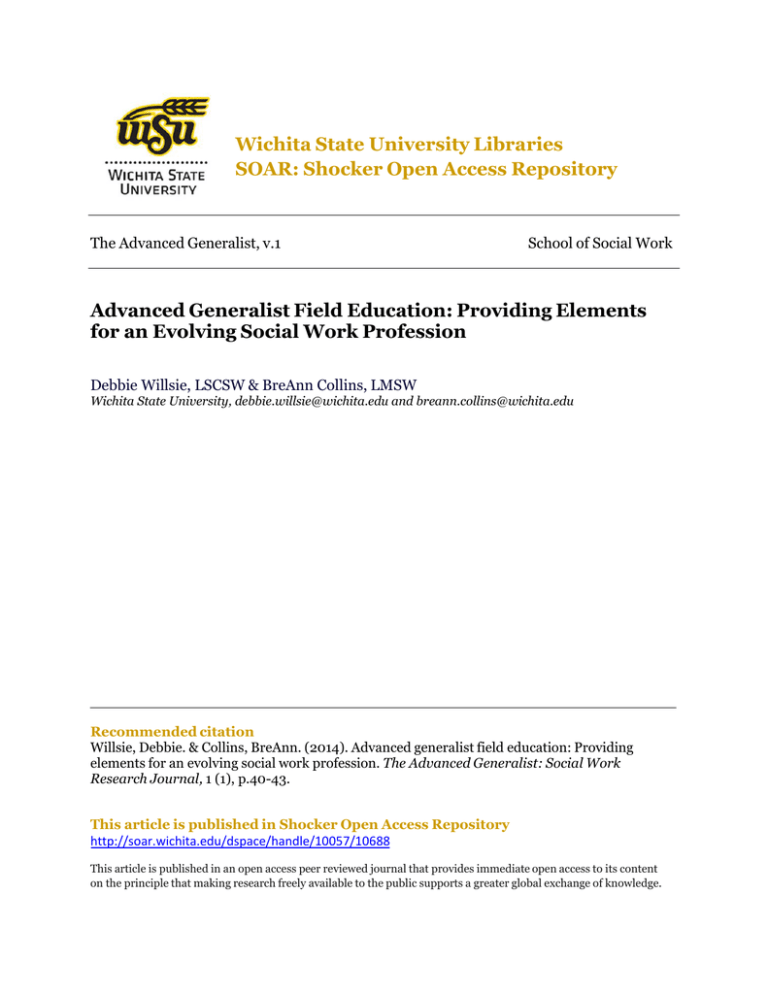
Wichita State University Libraries SOAR: Shocker Open Access Repository The Advanced Generalist, v.1 School of Social Work Advanced Generalist Field Education: Providing Elements for an Evolving Social Work Profession Debbie Willsie, LSCSW & BreAnn Collins, LMSW Wichita State University, debbie.willsie@wichita.edu and breann.collins@wichita.edu Recommended citation Willsie, Debbie. & Collins, BreAnn. (2014). Advanced generalist field education: Providing elements for an evolving social work profession. The Advanced Generalist: Social Work Research Journal, 1 (1), p.40-43. This article is published in Shocker Open Access Repository http://soar.wichita.edu/dspace/handle/10057/10688 This article is published in an open access peer reviewed journal that provides immediate open access to its content on the principle that making research freely available to the public supports a greater global exchange of knowledge. The Advanced Generalist: Social Work Research Journal v.1(1) 2014 Advanced Generalist Field Education: Providing Elements for an Evolving Social Work Profession Debbie Willsie, LSCSW BreAnn Collins, LMSW School of Social Work, Wichita State University, Wichita, Kansas 67260-0026, USA Received December 31, 2013 Accepted January 21, 2014 Published July 24, 2014 Citation: Willsie, D. & Collins, B. (2014). Advanced generalist field education: Providing elements for an evolving social work profession. The Advanced Generalist: Social Work Research Journal, 1 (1), p 40-43. Abstract Social work practitioners require competence in advanced generalist practice skills to provide appropriate social services to clients with various problems in a complex society. Competent advanced generalist practitioners utilize a variety of skills and knowledge to provide appropriate micro, mezzo, and macro interventions. The authors suggest that it is through the field practicum experience that students develop, practice, and determine their passions in social work. Social work field practicum is the foundation of social work education. It is through field practicum that students learn the skills to practice. Keywords: Field education, advanced generalist practice, social work Copyright 2014, Willsie, Debbbie & Collins, BreAnn. This is an open access article distributed under the terms of the Creative Commons Attribution License 3.0 (CC-BY-NC-ND) which permits you to copy and redistribute the material in any medium or format. You must give appropriatecredit. 40 The Advanced Generalist: Social Work Research Journal v.1(1) 2014 Advanced Generalist Field Education Always acknowledge people when walking into a room. Remember to say please and thank you. Treat others as you want to be treated. These are lessons we learned before we really knew what it all meant. These lessons are given to us throughout our life’s journey. Every building, person, and relationship has a foundation. Those lessons are the building blocks of relationships, a foundation – just like the foundation of a building. While they may look different from one another, each foundation serves the same purpose – to provide the strength for growth. Dictionary.com defines the word foundation as “the basis or groundwork of anything”. Everything requires a foundation. Strong foundations in buildings, in life and in one’s profession provide a structure for sustainability. Field education is defined as the “signature pedagogy” by the Council on Social Work Education in the Educational Policy and Accreditation Standards (CSWE, 2012, p. 8). Advanced generalist field education is part of the foundation for social workers to build their advanced practice. This begins a lifelong developmental process of a professional helper. With an advanced generalist practice perspective, the opportunities for helping are limitless. The Advanced Generalist social work model at Wichita State University includes the school’s four themes of social justice, cultural competency, multi-dimensional practice and empowerment. This model consists of the values and multiple roles the practitioner brings to each intervention (WSU School of Social Work Field Practicum Manual, 2012). Students integrate these themes into their learning and practice, and gain skills through field education that can be applied to all practice settings and eventually to work settings. In the generalist field education experience, students practice skills to attain the core competencies defined by the Council on Social Work Education, such as learning to assess individuals and families, advance human rights, and engage in policy practice, just to name a few. The skills gained in the field education experience are not unique to the setting. The field education experience is not meant to be an apprenticeship, where students are trained to work only in a specific agency or job. The knowledge, skills and ethics a student learns in the field placement generalize to any work setting which employs social workers. It is difficult for the student to anticipate where their social work journey will lead. In an interview with a practicing advanced generalist social worker in the community, the practitioner stated “that having an Advanced Generalist degree has greatly benefitted her in her social work career” (A. Morris 2014). She also reported that she has been told she is lucky to have the advanced generalist degree; others in the profession have reported that they felt somewhat boxed in with the knowledge they have been given and [have had] a limited learning opportunity to use those skills (A. Morris 2014). She also shared with the authors a variety of experience over the years and credits that to her advanced generalist training. She reports that she went into social work wanting to be a school social worker (see comment s8); however, over time, she changed her focus. Despite having learned specific skill sets for school social work, the advanced generalist perspective taught within her classes allowed her to focus on developing general skills based on the four themes of advanced generalist practice, rather than a specific track. Further, the different social work practice settings in which she has worked have included the 41 The Advanced Generalist: Social Work Research Journal v.1(1) 2014 prison system, disability services, hospital social work, clinical services in the military, school social work, and administration. She is currently using her skills at an insurance agency, where she serves in a quality assurance capacity (A. Morris 2014). The Advanced Generalist model and field experience provided the student a foundation of skills, ethics, and knowledge that allowed for this variety of practice competencies. Many students enter their field education experience not knowing exactly what they want to accomplish or the specific setting in which they plan to work. It is most common for students in their advanced social work curriculum to declare an interest in clinical direct practice social work. However, there are students who enjoy having endless possibilities, and who are open to whichever experiences come their way. These are advanced generalist social workers. Unquestionably, these students have ideas of what they want to do as professional social workers, but they find it exciting to know that one moment they can work at an agency assisting families with learning skills to raise healthy children, and then can move over and work with immigration refugees to assist them to getting acclimated to living in the United States. A strong foundation of knowledge, skills, and ethics in field education prepares the advanced generalist to follow their hearts and minds to any setting where differences are needed. References Council on Social Work Education. (2012). Educational policy and accreditation standards. Retrieved from http://www.cswe.org/File.aspx?id=13780 Dictionary.com retrieved from http://www.dictionary.reference.com WSU School of Social Work Field Practicum Manual. (2012). About the Author(s) Debbie Willsie graduated from Wichita State University with a BA in social work in 1980, and got her MSW from Syracuse University in 1981 with an emphasis in family mental health. She worked for two years at Horizons Mental Health Center in Hutchinson, where she became an LSCSW, then joined SRS in 1983 as a supervisor in Child Protective Services and Foster Care. She worked at SRS (now DCF) for almost 30 years, where she was an administrator in Children and Family Services, Human Resources and Training, and Community Services. She was a lecturer in the WSU social work department in 1994, and has served for several years on both the WSU Practicum Advisory Board and the WSU Social Work Advisory Board. She is currently the Chair of the Sedgwick County Suicide Prevention Coalition and is also actively involved in the United Way Standing Allocation Committee and Child Start Policy Council. BreAnn Collins graduated from Wichita State University with her BA in Social Work in 2003 and got her MSW from WSU in 2005. She has worked in a variety of social service settings. She began her career at Episcopal Social Services working in their Representative Payee program and served as the Administrative Assistant for their Teen Intervention Program. 42 The Advanced Generalist: Social Work Research Journal v.1(1) 2014 From there she moved on to United Methodist Urban Ministries (now Open Doors) and was their Transitional Housing Case Manager. BreAnn moved over to Wichita Area Technical College and served as the Career advisor assisting students plan their career goals. Most recently she has worked at Catholic Charities with the Marriage for Keeps program, counseling couples and individuals in making healthy relationship choices as well as assisting pregnant women with parenting and adoption choices. BreAnn is on the Kansas African American Healthy Marriage Initiative 43
